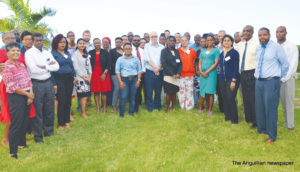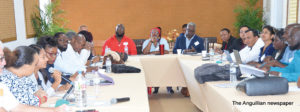
The Aedes aegypti mosquito, which is the vector for Dengue, Chikungunya, and Zika viruses, is not only a major public health issue, but a serious economic threat due to the negative impacts on tourism. Today a number of new, safe technologies exist which are being implemented in addition to the traditional vector control methods.
One method in particular that has gained much interest within the region is the natural and self-sustaining Wolbachia Method. The call was made during the Fifth Meeting of the Council of Ministers of Health of the Organization of Eastern Caribbean States (OECS) for a regional position on the new technologies, specifically Wolbachia. The method was developed by the World Mosquito Program (WMP), a non-for-profit organization operating out of Monash University in Australia. Research evaluated by the World Health Organization’s experts has demonstrated the efficacy of the intervention. The method has now been introduced into 12 countries with more sites in development. Wolbachia are bacteria that exist naturally in many insect species. When introduced into the Aedes aegypti mosquito, Wolbachia reduces the ability for the mosquitoes to transmit Dengue. Similar results have been demonstrated for the Chikungunya and Zika viruses. These mosquitoes continue to produce offspring that have Wolbachia, preventing successive generations from transmitting disease.
Recognizing the need to be more proactive in our approaches to vector-borne diseases, the Ministry of Health invited Dr. Jorge Osorio, a representative of the WMP to Anguilla to discuss the technology. This mission was done in collaboration with Public Health England (PHE). The visit culminated in a two-day forum involving representatives from 6 Overseas Territories [ Anguilla, British Virgin Islands, Bermuda, Cayman Islands, Montserrat, Turks and Caicos] and 6 OECS countries [Antigua& Barbuda, Dominica, Grenada, St. Lucia, St. Kitts & Nevis, St. Vincent and the Grenadines], French Overseas Departments and Belize. Representatives from the Caribbean Public Health Agency (CARPHA), Pan American Health Organization (PAHO) and the OECS Health Unit were also in attendance.
The forum commenced with a short opening ceremony, where Governor Tim Foy greeted the participants and reiterated the UK Government’s commitment to assisting countries to tackle the burden of mosquito-borne diseases. Permanent Secretary of Health, Merwyn F. Rogers elaborated on the increasing vulnerability of the region to mosquitoes.
 “In the Americas, Dengue fever was estimated to cost, on average, about $2.1 billion annually — based on 2010 amounts. These numbers are significant since Dengue fever occurs in such a large portion of the world. About 50 million to 100 million people are affected each year by this illness, and about 2.5 billion people live in places where the disease can occur. Scientists think the total numbers of people infected — and the total costs of the disease — can increase as the populations in affected areas boom and as the mosquitoes spread to new areas because of climate change”
“In the Americas, Dengue fever was estimated to cost, on average, about $2.1 billion annually — based on 2010 amounts. These numbers are significant since Dengue fever occurs in such a large portion of the world. About 50 million to 100 million people are affected each year by this illness, and about 2.5 billion people live in places where the disease can occur. Scientists think the total numbers of people infected — and the total costs of the disease — can increase as the populations in affected areas boom and as the mosquitoes spread to new areas because of climate change”
Further remarks by Dr. Jolyon Medlock of Public Health England (PHE) underscored the importance of international cooperation in vector management and pledged PHE’s continued programmatic support.
The two-day interactive forum provided extensive insight into the Wolbachia technology. Participants were also invited to share on countries’ experiences in mosquito vector control. Participants welcomed the exploration of the use of the new technology as one more “tool in the toolbox”.
During the closing ceremony, P.S. Rogers reiterated that smaller territories in the region are seldom at the forefront of research and innovation. He urged the audience to remain open to collaboration among our respective countries. Dr. Aisha Andrewin, Chief Medical Officer of Anguilla, closed the proceedings by thanking His Excellency, Governor Tim Foy, for securing UK government funding for the event through the Foreign and Commonwealth Office. She thanked Public Health England for their technical and administrative support and Dr. Jorge Osorio for the knowledge gained and the opportunity to discuss the technology among regional technical counterparts. Gratitude was also extended to the participants and their respective Ministries of Health and the representatives from CARPHA, PAHO and the OECS Health Unit. Dr. Andrewin highlighted the fruitful discussions held and looked forward to future work on a multi-country collaboration. The Ministry of Health acknowledges the contributions of the Department of Health Protection and the Government of Anguilla in making this endeavour a success.
– Press Release







